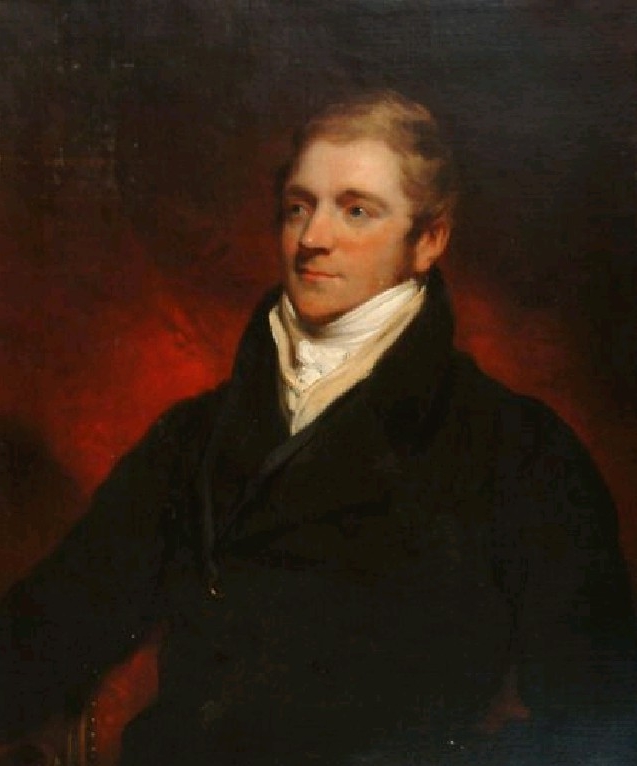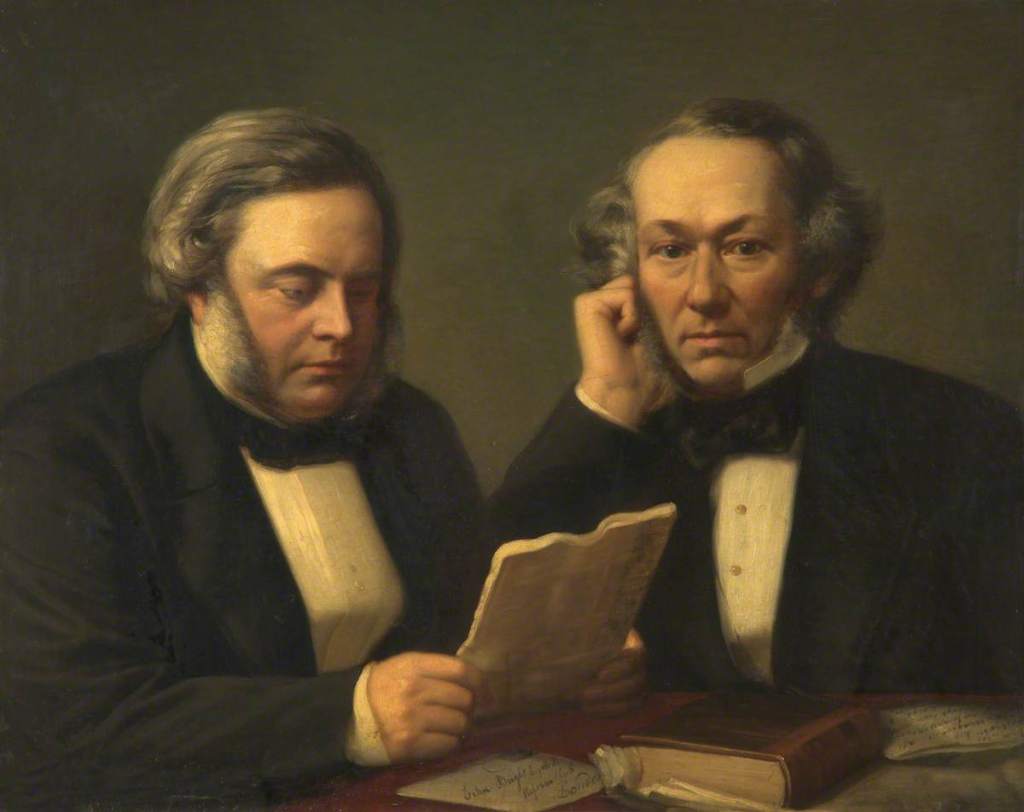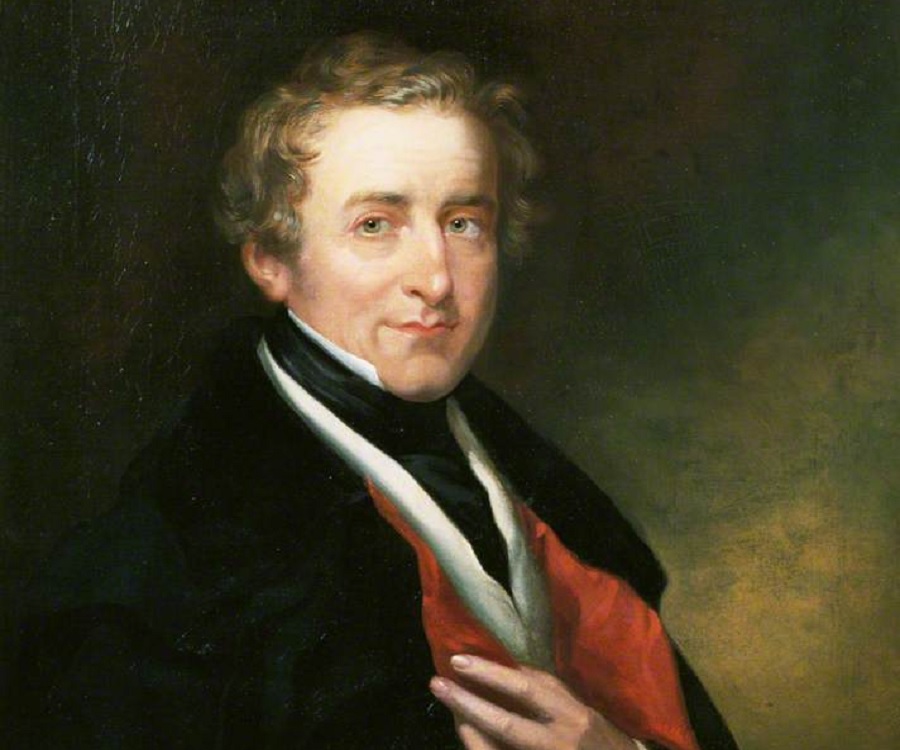The Corn Laws were in place between 1815 and 1842. During this time several petitions of repeal were made to Parliament; in all 1,414,303 signatures were presented within 467 petitions. There were, of course, signatures scribbled upon petitions against repeal of the Laws, but they were far fewer: just 145,855 signatures, a whole order of magnitude fewer!1 This goes to show just how powerful the country landowners were; no matter how bad things got, and no matter the number of signatures, Parliament would not budge. But there were folk chipping away at this issue, whether it be in the streets, in the townhouses, or in the corridors of power. Repeal would come, and there were several key players in the story, and in the second of my two posts on the Corn Laws, we shall meet them.
Thomas Tooke
An experienced merchant and economist, Thomas Tooke could see that the Corn Laws were having a deleterious upon the majority of the population. He argued that stopping the free grain in foreign grain was harmful to trade in broader terms, saying
There appears to be at the moment, a quantity of corn on one side of an impenetrable barrier, and a quantity of manufacturers on the other, which would naturally be interchanged, if it were not for the artificial hindrance occasioned by the present system.
The Laws were there to protect the landed gentry in the countryside at the expense of the income and quality of life of the working classes. It didn’t even help the farmers in the countryside because landowners charged them higher rents. As far as Tooke was concerned, making staple foodstuffs scarcer raised prices and adversely affected the working classes.2
Lord Liverpool, the Tory Prime Minister blocked his petition, but Tooke still presented his case to a House of Commons Select Committee in 1821. So impressive was his thinking and well laid-out his argument, he was made a Fellow of the Royal Society later in the same year. So, whilst his petition wasn’t debated, he still got to say his piece, which reinforced the idea to lower tariffs and emboldened those for whom repeal of the Corn Laws was the only fair and sensible option.2
Richard Cobden and John Bright
As soon as the idea of implementing the first Corn Law was debated in Parliament, anti-Corn Law groups sprang up all around the country, but they were not a united, cohesive front. This changed however with two industrialists Richard Cobden and John Bright, who together formed what would become known as the Manchester School. Tooke had taken the argument for repeal to the Commons, but Cobden and Bright would be so effective in communicating their argument that would both become MPs.
Richard Cobden owned a calico[*] printing mill and was the son of a poor farmer from Sussex, so could appreciate the harm the Corn Laws were inflicting on industry, and both the urban and rural workforce. He created the Manchester Anti-Corn League in 1839. His writing and speeches were based on the notions that free trade benefited the majority, and that manufacturing and trade should be allowed to continue with minimal interference from Parliament. In short, the Corn Laws ‘were both economically disastrous and morally wrong.’3
In 1941, he invited John Bright to join him and help him develop the political, economic and moral argument against the Corn Laws.4 John, also an industrialist, was Lancashire born and bred, a devout Quaker and a skilled orator, who managed to make protest and debate entertaining, ‘produc[ing] an entire theatre of opposition activity.’5
They made quite the team: John was the man of the people, the salt of the earth, able to communicate their ideas to the common man In the North of England. The country had – and still has – a strong north-south divide, and Cobden’s southern accent made his speeches in Parliament more palatable, allowing him to give insight into the economics of the industrial north. Together they began to turn the tide of opinion both within and without the House of Commons.
If you like the blogs and podcast I produce, please consider treating me to a virtual coffee or pint, or even a £3 monthly subscription: follow this link for more information.
Robert Peel
Sir Robert Peel became Prime minister for the second time in 1841. He had won his position – partially – on his view that the Corn Laws should stay in place. However, Cobden and Bright’s arguments persuaded him to rethink his position. Peel could see that the Laws were only benefiting landowners and that the working classes – and some of the middle classes too – were beginning to starve. It was not sustainable, and revolution was on the cards: the early 1840s had seen a series of wet summers, lowering production and raising prices greatly. Then, the Irish Potato Famine hit Britain received much of its corn from Ireland, but with a dying population, the workforce didn’t exist that could farm the grain; add to that, a great number of Irish emigrating to Britain to escape the crisis only exacerbated the problem.6 Something had to be done: the Corn Laws had to be repealed. The opposition party, the Whigs – the more liberal party of the day – were generally up for repeal, but two-thirds of the Tory party were vehemently against it. Peel had tried to pass an act to real the Corn Laws twice already, but as the Potato Famine reached its peak in 1942, he attempted to pass it one more time. This was a rare case of a Prime Minister going against their party majority, and he knew it would be career suicide should the act get through, and it did, with a majority of 98.
Peel resigned shortly afterwards, and the legislation surrounding the Laws was dismantled over the space of three years, leaving behind a country where the working and lower-middle classes were empowered and very much pro-free trade.6 The Manchester School had achieved its goal. The School is considered by many to be the first political pressure group, and a most successful one at that.
References
- Carpenter, K. Petitions and the Corn Laws. UK Parliament: Petitions Committees https://committees.parliament.uk/committee/326/petitions-committee/news/99040/petitions-and-the-corn-laws/ (2019).
- Smith, M. Thomas Tooke on the Corn Laws. Hist. Polit. Econ. 41, 343–382 (2009).
- Briggs, A. Richard Cobden. Britannica https://www.britannica.com/biography/Richard-Cobden (2022).
- John Bright. Quakers in the World https://www.quakersintheworld.org/quakers-in-action/304/John-Bright.
- Philp, M. John Bright and Richard Cobden: The Corn Laws. To the Barricades https://barricades.ac.uk/items/show/103.
- Boudreaux, Donald, J. Repealing the Corn Laws, 175 Years Later. Discourse Magazine https://www.discoursemagazine.com/culture-and-society/2021/06/18/repealing-the-corn-laws-175-years-later/ (2021).
[*] Calico is a wafty thin-weave cotton fabric.




